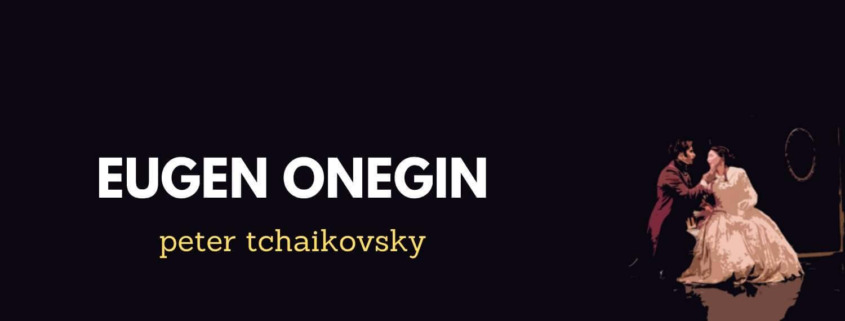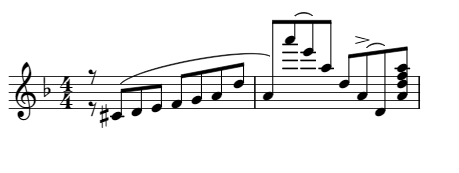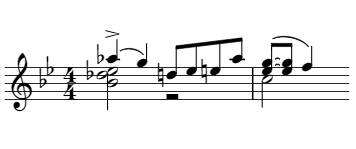EUGEN ONEGIN by PETER TCHAIKOVSKY – the opera guide & synopsis
The online opera guide to EUGEN ONEGIN
Tchaikovsky wrote ten operas. Eugene Onegin is his most famous and most beautiful opera. Emotional music, dazzling instrumentation and inner drama characterize this work. Tchaikovsky also gives us beautiful musical orchestral passages reminiscent of his greatest ballets.
OVERVIEW & QUICK ACCESS
Content
♪ Synopsis
♪ Act I (Country estate scene)
♪ Act II (Ball scene, Duel scene)
♪ Act III (Ball scene, in Gremin’s house)
♪ Comment
Highlights
♪ Ya lyublyu vas (Lenski’s arioso)
♪ Puskai pogibnu ya (letter scene)
♪ Kuda, Kuda (Lenski’s aria)
♪ Uzhel ta samaya Tatyana (Onegins Aria)
Premiere
St. Moscow, 1879
Libretto
Peter Tchaikovsky and Konstantin Shilovsky, based on the verse novel of the same name by Alexander Pushkin.
Main roles
Larina, widow and great landowner (mezzo-soprano) - Tatyana, her daughter (soprano) - Olga, sister of Tatyana (alto) - Lenski, Poet (tenor) - Onegin, Aristocrat and friend of Lenski (baritone) - Gremin, a rich prince (bass)
Recording recommendation
DG with Thomas Allen, Neil Shicoff, Mirella Freni, Anne Sofie von Otter conducted by James Levine with the Rundfunkchor Leipzig and the Staatskapelle Dresden.
SYNOPSIS
Comment
The biographical aspect
1877 was a decisive year for the 37-year-old composer. In addition to his work on “Eugene Onegin,” his unhappy marriage occurred and he established an epistolary relationship with Nadezhda von Meck. In addition, he had a rapturous relationship with a violin virtuoso. But one thing after another. Tchaikovsky wrote to his brother Modest in January of that year about his rapturous love for Josef Kotek, whom he had met years earlier through his teaching at the Moscow Conservatory. In the previous year, Tchaikovsky had toyed with the idea of marrying in a manner befitting his station, in order to counter the pressure from family and society.
In May, a love letter from a student reached him at the time when a teacher friend suggested that he use Pushkin’s opera “Eugene Onegin” as material for a new opera. After initial hesitation, Tchaikovsky wrote the sketch of the opera in a state of intoxication during a sleepless night. At this point, reality and fiction began to mix, as Tchaikovsky faced the same dilemma in his private life as the novel character Onegin, with the only difference that the love letter did not come from Tatyana, but from his future wife Antonina Ivanovna.
With the help of Shirov, he tackled the libretto and by June the first act was ready. At the same time, his relationship with Antonina developed rapidly and the wedding was celebrated as early as July, although Tchaikovsky was not in a celebratory mood, for just a few months later he attempted suicide by plunging into the ice-cold Moskva River. After a subsequent nervous breakdown, his brother Modest informed Antonina by letter of their separation, and Tchaikovsky recovered sufficiently to finish “Eugene Onegin” with the two final acts in San Remo in January 1878.
Literary model / libretto
As a well-traveled music critic, Tchaikovsky knew the opera literature very well and some of the developments displeased him. He was a sharp-tongued observer and a critic of Verdi (“insipid organ grinder melodies”). He criticized Verdi’s development in the direction of “Grand Opéra” and elaborate operas, such as Aida of 1871, as monumentalism and showmanship. For him, the inner life of the characters was in the foreground in musical theater. Pushkin’s work offered him this opportunity, and Tchaikovsky, together with the literary figure Shirov, specifically selected four passages from his poem “Eugene Onegin”.
Soon he got rid of Shirov’s support. He selected the verses himself and adopted them largely unchanged. He subsequently referred to his work not as an “opera” but as “lyrical scenes.” He deliberately did not seek a widely ramified plot like Verdi or Wagner, but chose the form of a chamber opera. Nevertheless, the work may be called dramatic, and the opera-goer is grateful for the clear and comprehensible plot. Onegin dedicated each act specifically to one main character. In the first act, Tatyana’s character is in the foreground, in the second that of Lensky, and finally in the third Onegin. Tchaikovsky was able to establish a relationship with all the characters; in addition to the relationship with Onegin and Tatyana described above, he recognized himself in the dandyish artist Lensky in his youth.
Leitmotifs and music
In 1876, Tchaikovsky visited the Bayreuth Festival and saw the “Ring des Nibelungen” there. He did not express himself very flatteringly about Wagner’s music. To what extent the German influenced his music is difficult to assess; in any case, Tchaikovsky deliberately used memory motifs in the Wagnerian style in “Eugene Onegin.” In the section on the letter scene, we present four of the most important motifs of “Eugene Onegin”. In addition to the motives, the work is characterized by solos and duets. Only in the second movement do we hear a short quartet.
The solo pieces, with the exception of Lenski’s aria, are not classical arias in scope, but in Tchaikovsky’s usual manner have the character of ariosi, that is, they are more concise and less varied.
Premiere and review: Although Tchaikovsky was already an established composer and had already succeeded in creating masterpieces with, for example, the First Piano Concerto or the ballet “Swan Lake,” he could not be sure of the success of a new opera. His previous four opera projects had met with little success, and even his best work, the opera “Opritschnik”, was, in his own words, at best a “successful failure”.
Because the composer disliked the pompousness of a grand opera staging, he chose the Moscow Conservatory as the venue for the first performance of “Eugene Onegin” in January 1878. The work was staged under the direction of the rector and friend Nikolai Rubinstein, mainly with young singers and instrumentalists from the Conservatory, and was largely well received by audiences and critics. The first performance in a traditional opera house, did not take place until two years later at the Bolshoi Theater, which also met with a good response. However, it was the 1884 performance in Prague conducted by Tchaikovsky that launched the success of this opera, which subsequently became the most performed Russian opera.
EUGEN ONEGIN ACT I
The introduction leads us into a melancholic mood, threatening undertones hints at the drama which is going to take place.
Introduction – Fedoseyev
Synopsis: On Larins country estate. Larina thinks back to her youth when she was unable to marry an officer she loved. She listens to her two daughters while the peasant girls sing Russian folk songs in the background.
Sophie von Otter and Mirella Freni in a beautiful duet followed by a quartet.
Slikali – v.Otter/Freni
Synopsis: Farmers bring in the harvest.
A beautiful choir introduces us to the (strenuous) world of peasants in Russia from 1810.
Bolyt moyi skori – Levine
The sisters contrast in character
Synopsis: The two sisters couldn’t be more different in character. Olga is cheerful and exuberant, Tatjana is dreamy and introverted.
Kak ya lyublyu..Uzh kak po most – Freni / von Otter
Lenski’s Arioso
Synopsis: Lenski appears. He is a poet and neighbour who loves Olga passionately… He is accompanied by Onegin, a neighbor and aristocrat. While Lenski is a passionate man, Onegin, a cool rationalist, was a man of pleasure for a long time and has been bored on his uncle’s estate for some time. Lenski is pleased about the reunion with Olga.
We hear Lenski’s Arioso in German from Fritz Wunderlich, who died at the age of 36. A rapturous and yet touching recording.
Ya lyublyu vas (Ja ich liebe dich) – Wunderlich
Tatyanas letter scene – she is in love
Synopsis: Tatjana goes for a walk with Onegin, she feels strangely attracted to him while Onegin seems rather aloof. In the evening she can’t fall asleep. The sensitive Tatjana has become aware that she has fallen in love with Onegin. She sits down at her desk and writes Onegin a rapturous love letter. The same evening she has the letter brought to Onegin.
The letter scene is one of the great monologues of opera history. In this famous scene Tatjana goes through all the emotions. From hopeless despair to ecstatic high spirits. The monologue is divided into four sections, each of which could stand alone.
The introduction describes Tatjana’s ardent longing. The vibrating tremolo of the strings reflects the inner restlessness and discord. The change of the orchestral introduction to rapid semiquavers with plucked eighths of the excited heartbeat imitate her excitement about whether to write the letter. Soon Tatjana begins with her decision: “Puskai pogibnu y” (“And if it were my end”). The singing becomes more feverish, increasing waves up to the high A flat end with the decision to sit down at the desk immediately “vezdy, on predo mnoyu!”
When Tatjana sits down at her desk, she falls silent, the orchestra calms down and begins with a new, this time calm introduction. Tatiana’s leitmotif is audible in the strings:
She takes the pen in her hand, but after a few bars she falters, what should she write? Onegin’s motif appears, repeated tenderly sung several times in the oboe:
But she hesitates: “ne v silakh ya vladyet svoyei dushoi!” (“I do not have the strength to subdue my heart!”). What is the alternative? Tchaikovsky quotes Tatiana’s solitude motif in the flutes:
With Onegin’s motif in the orchestra she begins to write (“zachem vi posetili nas?”, “Why did you visit us?”), she reveals everything. She writes the confession of her agony. Tchaikovsky increases the tempo constantly and the music becomes more and more urgent. Then the mood changes suddenly when the oboe sings the motive of the confession of love:
At first Tatjana hesitantly takes up the motif tenderly: “Kto ti: moi angel li khranitel” (“Who are you? My guardian angel or a wily tempter?”). The fear of rejection is great, but she wants to try. As she signs the letter, glorious brass and cheering strings sound and Tatjana ends the aria with trembling words.
Anna Netrebko’s interpretation of the letter scene is simply great. She masters the intimate parts of this piece, her singing is subtle, the piani are breathtaking, only to create ecstatic top notes a little later in great embers from the full throat.
Puskai pogibnu ya – Netrebko
Onegin visits Tatjana
Synopsis: A new day is dawning. Girls pick berries.
Dyevitski, krasavitski
Synopsis: The next day Onegin comes along personally. Tatjana is excited. She is afraid, Onegin laughs at her exuberance. Onegin rejects her love. Marriage is alien to his soul. She will soon meet someone else and forget him. Humiliated, Tatjana sinks to the chair.
Hvorostovsky’s interpretation is poignant, warm and elegant, yet conveys the distance the role requires.
Kogda bi zhizn – Hvorostosky
EUGEN ONEGIN ACT II
Synopsis: In honor of Tatyanas a ball is given in January on her name day. Lensky took Onegin with him. But he soon gets bored and takes revenge on Lenski by dancing with Olga again and again. When Lenski gets jealous, Olga makes fun of him.
The ¾ beat has always inspired Tchaikovsky. While the guests dance their waltzes and have fun, the drama begins unnoticed.
Tchaikovsky creates great effect: during the exuberant dance, in Lenssy the inner drama is about to unfold.
Entracte & Waltz – Levine
Synopsis: A Frenchman who lives nearby surprises Tatjana with a couplet in French.
A cette fête inviée – Sénéchal
Onegin plays a dangerous game
Synopsis: Onegin further provokes Lensky and the two get into a terrible argument. Meanwhile the guests have stopped dancing and are listening to them. Lenski loses his nerve and demands satisfaction.
Onegin plunges unstable Lenski into misfortune.
Ti ne tantsuyesh, Lenski – Weikl / Burrows
Synopsis: Lenski apologizes to Tatjana’s mother for the scene and Onegin regrets that he irritated his friend Lenski so much. But the drama cannot be stopped and Onegin decides to teach Lenski a lesson. A duel is arranged at sunrise.
In this scene Tchaikovsky proves to be a master of characterization. Each of the emotional worlds of the 4 roles is portrayed in a great way.
V Vashem dome – Beczala / Netrebko
Lenski’s great aria Kuda, kuda
Synopsis: It’s early morning. Lenski stands in a dismal snowy landscape. He is waiting for Onegin. In the presentiment of death, his thoughts wander back to his past youth and his love for Olga.
The opera is based on a novel by Alexander Pushkin. Pushkin has taken part in twenty-nine duels throughout his life. In the last duel he was fatally wounded by the hand of a French officer. As if he had a premonition, the prehistory had a great resemblance to that of this novel.
Kuda, kuda has become a showpiece for many tenors. You will find 4 different versions of this aria in the Play list.
In the first you get an impression of a Russian tenor in an amazingly good sound quality (recording year 1912) with the voice of perhaps the best Russian tenor Leonid Sobinov (“Lenski’s Aria”). Russian tenors sound somewhat unusual for western ears. They are high in timbre and very elegiac and sing beautiful lines. But the voices are less colorful and almost small (Kesting).
Kuda, kuda vy (Lensky’s Aria) (1) – Sobinov
The aria’s mood fits perfectly with Björling’s naturally melancholic voice. The beauty of sound and pain in the voice are striking.
Kuda, kuda vy (Lenski’s Aria) (2) – Björling
Julius Patzak was the tenor of the elegiac tones. He could express the melancholic tones like few others. His interpretation is sung in German.
Kuda, kuda vy (Lenski’s Aria) (3) – Julius Patzak
You will hear an excellent version from Placido Domingo. His Russian sounds surprisingly authentic (at least for someone who doesn’t speak Russian…).
Kuda, kuda vy (Lenski’s Aria) (4) – Domingo
Synopsis: Onegin appears. The seconds give the two their weapons. The two line up. A shot is fired and Lenski is killed.
EUGEN ONEGIN ACT III
Entracte Polonaise – Solti/ROH
Gremins Aria
Synopsis: Years later. In a ballroom in St. Petersburg. The old prince Gremin appears with his wife – Tatjana ! Gremin tells the surprised Onegin that he has got married two years ago.
This Russian opera is a perfect opportunity to get to know Russian singers. Characteristic for Russian basses is the dark almost black color of their voice while tenors usually have high, elegiac voices. You can hear a wonderful example of a Russian bass voice with “Gremins Aria” interpreted by Boris Shtokolov.
Gremins aria – Boris Shtokolov
Onegin’s great aria
Synopsis: Onegin is in shock. Passion suddenly boils up in him. The memory of Tatjana, the deadly duel and the lost years shake him deeply. At the sight of Tatjana he has to admit that he has fallen in love with her.
The famous English critic John Stean praised the voice of the Russian baritone Pavel Lisitsian. Not only in Russian roles but he was also the perfect Verdi baritone with his slightly metallic, beautiful voice, which also shines in the high notes. Kesting is also enthusiastic. ” I never heard Onegins aria more beautifully”.
Uzhel ta samaya Tatyana – Lisitsan
The tragic finale
Synopsis: It is morning at Gremins’ house. Tatjana has received a letter from Onegin, an apparition from her past. Onegin appears. Tatyana tells him how 2 years ago Onegin where she only found severity in his heart. Happiness was within reach, so close, but now she is married and asks Onegin to leave. Onegin refuses. Moved Tatyana confesses her love. But her loyalty belongs to her husband. Onegin does not want to accept this. She says farewell for ever and leaves the room. Onegin flees the house.
We hear and see an excerpt from this scene in a gala concert by Anna Netrebko and Dmitri Horostovsky from the Red Square in Moscow.
O! Kak mne tiazhelo – Netrebko/Hvorostovsky
Tatyana is not an Anna Karenina who leaves her husband for another man and so in this opera all 3 main characters are left behind as losers. Tchaikovsky staged the first performance in the conservatories with young people from the conervatory, because everything pompous was repugnant to him for this opera. For in this work the focus is on inner world of the roles, it is a classical chamber opera. This should be taken into account when staging the opera, despite the drama and ball scenes.
Recording Recommendation
DG with Thomas Allen, Neil Shicoff, Mirella Freni, Anne Sofie von Otter under the direction of James Levine with the Rundfunkchor Leipzig and the Staatskapelle Dresden.
Peter Lutz, opera-inside, the online opera guide to EUGEN ONEGIN by PETER TCHAIKOVSKY








Hello!
In the item “Uzhel ta samaya Tatyana – Lisitsan” you provide the https://www.youtube.com/watch?v=wATIWu3W_GQ This link refers to another aria, namely “Vy mne pisali” which precedes the aria “Kogda bi zhizn domashnim krugom.” You can easily check this by listening to the aria further to 1:40 and comparing it with the aria https://www.youtube.com/watch?&v=qa_13xMhjkg
Regards,
Rastem Gizatllin